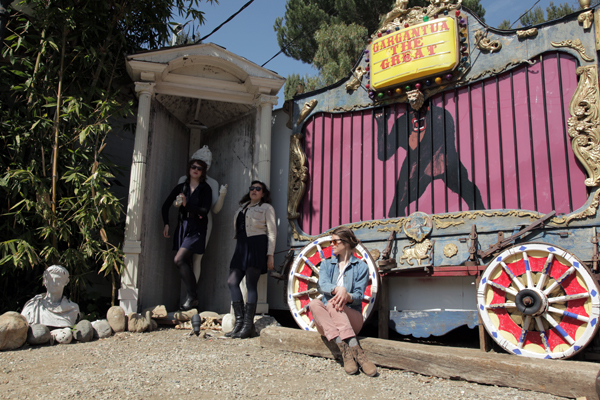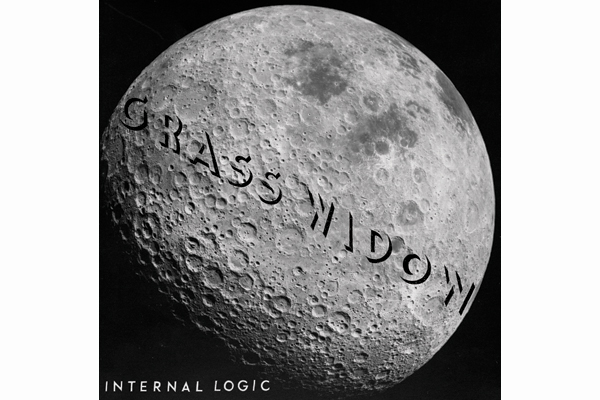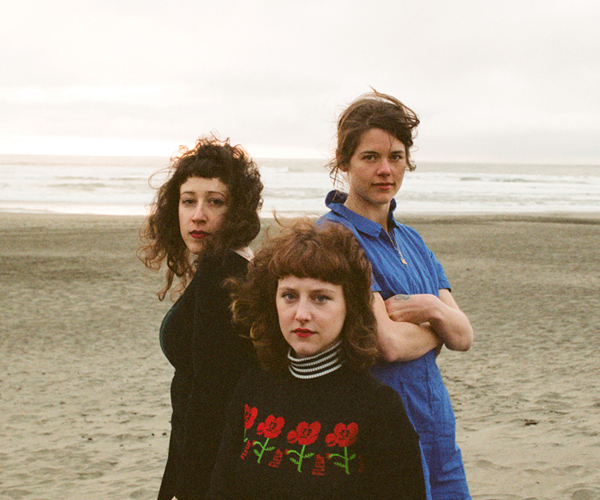If you’re into computers, you should know that Grass Widow’s latest album, Internal Logic, has nothing to do with data functions. As far from the online world as you’re likely to get, the San Francisco based three-piece consists your usual guitar, drums and bass combination born of a staunchly DIY attitude and carried along a graceful melodic line of vocal harmonies.
Of course, it’s harmony within a world of discord that Grass Widow have always sought in their self-created sonic universes; where that tension between inner wisdom and outer madness is often recreated in their equally taut musical arrangements. Rattling rhythms evoke a sense of urgency and anxiety that only mellow vocals, bubbling at the surface, can soothe. But then, even their lyrics are loaded with meaning, as ‘Advice’ argues the vapidity of blind ambition and ‘Disappearing Industries’ deconstructs modern life and the way we live it.

Grass Widow have come a long way from their days as a band bloomed from an early incarnation known as Shitstorm in 2007. Respective bassist and guitarist Hannah Lew and Raven Mahon are now in their early 30s, two women who’d lost drummer Frankie Rose to New York and the Vivian Girls, guitarist ‘Wu’ to the call of his bicycle and Guatemala. With the appearance of drummer Lillian Maring, what came out of it is a sound and a way of life founded on firm principles. Their underground success came, while by-passing modern modes of self-promotion and going on their own gut instincts from the outset. Now they are a band of purpose, touring with the likes of Sonic Youth and The Raincoats, appearing on alternative comedy Portlandia and weighing in on the discourse over age and gender –whether they like it or not.
On a conference call from Hannah’s mum’s house in San Francisco and amid discussion of their music and what it is that moves them to create, Grass Widow touch on being a woman in music, feminism today and why the online trend toward bigoted satire is only toxic to the cause.

aqnb: Where do you think you fit in on the social and political time line as musicians today?
Hannah Lew: There’s probably some label that they’re going to put on what’s going on right now for women in culture. We’re just trying to be included in the audience and help other women be included in the audience for movies and music and all of that. I think it’s so shitty to be constantly interacting with art and music that is so obviously for men. It sucks.
Women are trying to find a voice for themselves and also be included in the audience. Because it sucks when you go to a show and it’s not made for you. I think that it happens a lot in hip hop, where a lot of the songs are describing a caricature of a girl; not that many women can find themselves in that audience. It’s the same thing with punk rock. It’s like, ‘is this even for me?’ I know, for me, I want to feel like stuff is for me as well, or at least includes me.
I know in San Francisco and every other city in the world, where you’re walking down the street and there’s men just talking about your body constantly. I think they feel like that’s okay to do because they see those kinds of attitudes in movies. Movies get the idea that that’s okay because they get that from pop culture, and pop culture gets that from sub culture. I feel like we’re all slowly working towards making it better, so that one day our great-great granddaughters can walk down the street without someone talking about their boobs.
aqnb: I like how you said, Raven, that if people really paid attention to the inherent misogyny in society, they’d be offended all the time. Modern culture is not very explicit about its embedded bigotry.
Raven Mahon: It seems really relevant and really important to continue the conversation. It’s not perpetuating the problem to continue talking about these facets of feminism that are still out there. Without having the conversation that voice gets lost. You have younger girls who are looking at pop culture magazines, who don’t also hear women who are part of pop culture, playing music and are speaking out against that. How else would they know?

aqnb: The style, or the genre, of music you play can be quite limiting, in a way. Is that why you’ve extended yourself with the instrumental tracks ‘A Light in the Static’ and ‘Response to Photographs‘?
Lillian Maring: We never chose a genre. That’s a label that gets placed on you when people want to talk about you and don’t want to describe your music creatively or talk about how they feel about your music; where there has to be some kind of a catch phrase to describe your sound. The unique thing about our band, and something that we can all agree on, is that we’re not focusing on, ‘let’s make this song more garage-y, or lets make this song sound more like women wrote it,’ because it’s really obvious. We’re just trying to create interesting compositions with minimal means, which is the instruments we play and our voices.
HL: This is our third LP, so naturally we’ve grown a lot. We’ve been a band for five years so we have to do what’s exciting for us. We’re following our bliss and we’re trying to find transcendence from our problems, or things that we care about. We’re just trying to find better ways to describe how we feel. So, if there’s a need for an acoustic guitar or a crappy piano then we’re going to put in on there.
aqnb: This is something that’s been on my mind for a while, what does the title ‘Response to Photographs’ mean?
HL: When we were making Past Time, my father passed away. We were making that album and we were all having such a hard time. Lilly had moved away to be with her friend who was sick and there were these terrible things going on everywhere. It just felt like the world was crumbling all around us.
My Dad had died suddenly and there was this terrible grief and that album, all those songs, were passes at different narrations of trying to understand death, basically. It was just so hard. All the songs had so many words and I felt like I was trying to do my father justice or something. We couldn’t even play most of those songs out because it was so sad for us; literally, trying to stop crying on tour.
When we wrote Internal Logic, we really wanted to write songs that we could feel good playing, were affirmations for us and made us really happy to play and the songs just felt good. At some point, we had to find childhood photos of ourselves. We were at my mum’s house, actually, where we are right now, and we were looking through all these old photos. Seeing all these photos of my dad, getting really sad and just realising I’m able to do a lot of hopeful things. It’s been three years since he died and we’re able to put out really hopeful record. All the songs are there because we’ve made it through this terrible time of grief and we’re on the other side.
I found myself being really over-whelmed with this melody and, it sounds really cheesy, but I found myself literally running over to the piano and playing that. Then I tried to play it a little better. It was on my mum’s out-of-tune piano and I’m not a very good piano player. I guess we could have had some professional pianist come and play it really well but it was a really raw moment and it was literally a ‘response to photographs’.
aqnb: Do you think there’s a big element of having the right look, advertising, that you need to actually make a living as a musician?
HL: Sex sells that’s for sure. [laughs] It sells but I wouldn’t want to be more successful because people thought we were more, sexy. In the end, yeah, you’re more successful, you did make more money but people are talking about your legs all the time. I’m not doing this because I want people to talk about my legs. If I wanted to do that I would try to pursue modelling, which would be hilarious, but I’m trying to do music and we, as a band, are just trying to make it on our own merit.
aqnb: Do you make a living?
RM: No [laughs], definitely not. We just started this label, HLR, and this is our third release. The first two were the repress of our first self-titled full length and then the ‘Milo Minute’ seven-inch. We’re definitely financially in a hole right now and hopefully we’ll make money on this next one; we’ll make back the money we put into it.
We feel really good about having made it ourselves and knowing all the work that’s been put into it, not having bunch of middlemen to work with. But we’re not making money on it. We make enough at shows to fund our tour.
HL: It sucks that, in the US especially. I hear of people overseas getting grants from their government to go on tour and get equipment and record. In the ‘States, they definitely treat you like you’re kind of an idiot if you want to make art or music. But those things are really valuable because those are just a non verbal way of describing our world and having more nuanced voices about who we are as humans. For some reason it’s not valued.
aqnb: Your lyrics and your ideas are still quite politically and socially motivated.
HL: I’m still amazed that there’s been something that we’ve made in our lifetime that has been a part of culture right now. I feel really lucky and it’s not like a million people but if, as a friend once said, there are a thousand nerds that are into our music, I just feel like we’ve done it. We’ve accomplished something.













